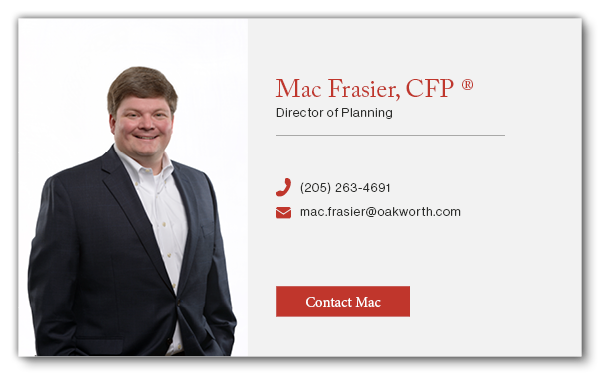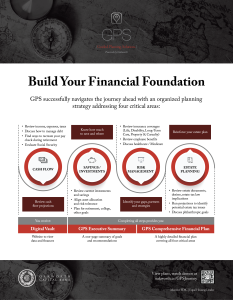October is recognized as Financial Planning Month, which provides a great opportunity to get your finances in order before the busy holiday season. When it comes to creating your financial roadmap, there are four cornerstones that you should keep in mind.
The Four Cornerstones are as follows:
- Cash Management
- Savings/Investments
- Risk Management
- Estate Planning
Estate plans can vary widely based on net worth, family dynamics, charitable desires and many other factors. For the last week of Financial Planning Month, we are going to examine the estate planning documents every person should have, regardless of their circumstances.

Will
To put it simply, a will is a document that instructs your executor on how to distribute your assets and care for any minor children after your passing. It is important to note that beneficiary designations on retirement accounts, life insurance policies and accounts with a Transfer on Death (TOD) or Joint Tenants with Right of Survivorship (JTWROS) titling will supersede any bequests made in the will.
Key terms in a will
- Testator/Testatrix – the person who is making the will
- Executor/Executrix – the person appointed to execute/distribute your estate according to the will after your passing
- Probate – Legal process through which a court examines, approves and enacts the terms of a will. The process may take several months and includes court fees.
- Guardian – the person appointed to care for your minor children after your death
- Codicil – a process allowing you to amend certain parts of the will while keeping other parts the same
- Testamentary Trust –trust set up through your will that becomes effective upon your passing
- Beneficiary – someone who receives an inheritance through a will
- Bequest – a provision in a will that leaves property to someone
- Intestate – a person who dies without a will is intestate
What happens if I do not have a will?
Dying without a will, or dying intestate, means that your assets will not necessarily end up where you want them to. Each state has its own intestate succession laws. In most places, the estate automatically transfers to the deceased’s spouse and, for single persons, to any children or to the parents. The drawback to this process is that it can be very costly and time-consuming compared to having a will. If you have children under 18 and have not named a guardian, the court will name one for you, which could result in someone you would not have chosen being appointed.
Power of Attorney (POA)
A power of attorney document allows you to authorize a person of your choice to manage financial matters on your behalf if you are not able to during your lifetime.
Key Terms in a power of attorney:
- Principal – the person making the power of attorney and granting authority to someone to act on their behalf
- Agent/Attorney-in-Fact – the person that the principal is appointing to act on their behalf
- General Durable Power of Attorney – Authorizes someone to act in a wide range of legal and business matters and remains in effect even if you are incapacitated. The POA can take effect immediately or can become effective only if you are incapacitated.
- Limited Power of Attorney – Gives the agent the power to act on behalf of the principal in specific matters or events. For example, a person may set up a limited power of attorney to manage their business affairs if they are out of the country for six months.
- Medical Power of Attorney – Appoints someone else to communicate with doctors to make medical decisions for you in the event you are unconscious or otherwise unable to communicate with doctors. This document differs from an Advanced Directive, which details end-of-life care.
What happens if I do not have a power of attorney?
If you do not have a power of attorney and become unable to manage your own affairs, it may become necessary for a court to appoint someone to manage on your behalf. The court must first find that you are incompetent, which takes away any right to manage your own affairs. This can be an expensive and time-consuming process.
Advance Care Directive (Living Will)
An advance care directive is a document that allows you to tell what your wishes are for medical and end-of-life care should you be unable to make those decisions for yourself. If you have ever said to a spouse or loved one, “I don’t want to be a vegetable,” this is the legal document that allows your wishes to be known. As part of the advance care directive, you will be able to appoint your proxy and state your preferences regarding: CPR, ventilator use, nutrition (feeding tube & IV fluids) and any other choices about your care.
What happens if I do not have an advance care directive?
If you do not have an advance directive and become unable to make medical decisions by yourself, you may receive medical care that you would not have wanted. If there is no advance directive, the doctor may ask your family about your treatment. Because family members may disagree about care decisions, it is possible that care may be delayed, or you receive care against your wishes. In cases in which there is no one to act on your behalf or family members cannot come to an agreement, the court may appoint some one to act on your behalf.
In order to create these documents, you will need to engage with an estate planning attorney. Before your first meeting, your attorney is likely to send out an estate planning questionnaire. This questionnaire is to help the attorney gain a better understanding of your family and financial situations to provide you with the best possible advice. If you are already working with a financial planner, your planner may be able to provide documents that can save time on the homework from the attorney.
It is a best practice to review your estate planning documents at least annually, at a minimum confirming that you still have the correct persons listed as: executors, guardians, trustees (if applicable), power of attorney and beneficiaries. Any minor changes that need to be made can likely be addressed using a codicil. Major life changes such as getting married or divorced; having children; remarriage/blended families; buying/selling a business; or death of a spouse are likely to necessitate working with your estate planning attorney to conduct a more complete review.
If you’re also interested in Estate Tax, check out this article written by Richard Littrell titled A Brief History of The Estate Tax
Guided Planning Solutions
Not sure where to get started? Oakworth’s Guided Planning Solutions (GPS) can dive deeper into some of the answers to these questions. To learn more about our process or download a sample of our plan, visit to our Guided Planning Solutions page.
Thank you for your time this week. I hope you found this series informative. If you are ready to take the next step in creating your financial plan, please reach out to your Oakworth Client Advisor.

This document is being provided for informational and educational purposes and is not meant to be taken as specific advice. Oakworth Capital Bank does not provide tax or legal advice. All decisions regarding the tax and/or legal implications of these strategies should be discussed with your tax and/or legal advisors before being implemented.



